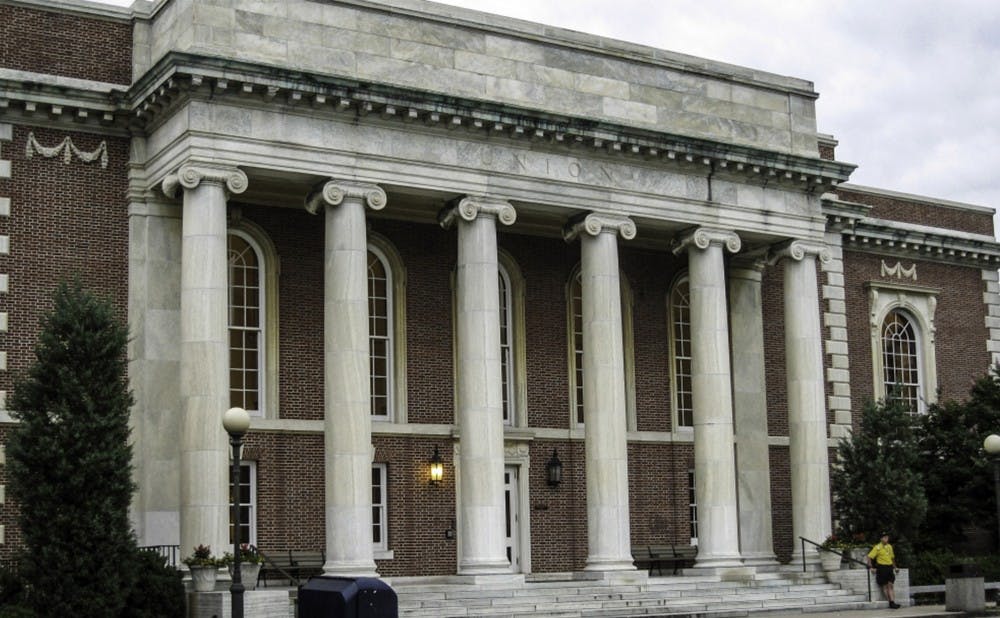Marketplace is a staple of first-year life—but very few know what it takes to feed East Campus.
Marketplace offers three meals a day during the week and two on the weekend—brunch and dinner. Last Spring, Duke Dining transitioned from Bon Appétit Management Company, which provides food service to universities across the country, to a self-operating system, hiring Mark Turner as executive chef and Todd Dumke as executive sous chef. Both said that they are committed to serving the type of students Duke attracts, whom Turner described as "coming from affluent families."
“They've traveled well. They understand food. They've eaten probably all over the world," Turner said. "I think their expectations are a little bit higher than some of the places that I've been to. We try to meet that expectation with quality food that's produced properly.”
Writing the menu
Dumke said that in creating Marketplace's menu, the chefs worked with nutritionists and considered students' allergies.
Marketplace staff meets with first-years dealing with severe allergies at the beginning of the year to discuss accommodation. It also has a strict no-nut policy, Turner stressed.
Turner has to ensure that the menu is logistically possible for Marketplace’s equipment and staff while also being creative.
“I don't just want to come in here and do another chef's food,” Turner said. “It's important to me that I have my mark on this operation and that my chefs get to flex their culinary skill and be involved with the creativity of the menu.”
Ultimately, he explained that there is a level of uncertainty with writing any menu.
“It's just an educated guess on what food you're going to use. It takes a lot of experience to understand that,” Turner said. “It's guesswork. There's no formula for it.”
Sustainability
Dumke also said that Marketplace has been working to improve sustainability. For example, they only use recyclable packaging.
“Even in the grab-and-go stuff in the Trinity Cafe, the sandwiches and fruit cups, those are made with a corn based, recyclable plastic," Dumke said. "Duke has gone to no Styrofoam, no plastic.”
He noted that Marketplace is committed to having 20 to 25 percent locally-sourced food, but said that a larger proportion than that creates challenges because local farms cannot sustain the size of Marketplace's operations.
“Idealism and reality have to intersect,” Dumke said.
His first consideration in purchasing food is to work with North Carolina farms and then moves to out-of-state sellers. But he said that local sourcing is not always possible because local farms cannot provide all the types of produce that Marketplace needs year round.
If there is an extra food left over, Marketplace donates it to Durham Rescue Mission, a nonprofit organization that provides food and shelter to the homeless.
Serving a diverse community
Turner noted that he understands the ethnic diversity of the students he serves and tries to account for that in his menu.
“We always have a little variety of everything at each station, not concentrating on one,” Turner said. “What is America made of? It's made of people from all over the world. Still to this day, America is big melting pot from people all over the place.”
Dumke added that the chefs use "shift reports" to communicate to each other what students liked and did not like to maintain the quality of food.
At the beginning of the year, Duke was named number one in collegiate dining by The Daily Meal, but Turner said that the ranking did not intimidate him, nor has it diminished his drive to provide a quality dining experience.
"Because you're number one in a magazine doesn't mean anything," Turner said. “It doesn't mean anything to anybody. Are you really number one? Do you carry yourself like you are number one everyday? That's the question.”
Get The Chronicle straight to your inbox
Signup for our weekly newsletter. Cancel at any time.
Class of 2019
Editor-in-chief 2017-18,
Local and national news department head 2016-17
Born in Hyderabad, India, Likhitha Butchireddygari moved to Baltimore at a young age. She is pursuing a Program II major entitled "Digital Democracy and Data" about the future of the American democracy.

